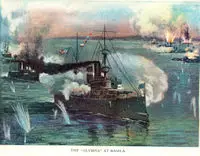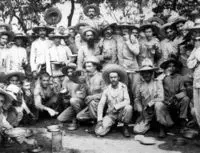How did Spain's defeat in the Spanish-American War (1898) change the country
The Spanish-American War was a brief but bloody war, that profoundly changed America and especially Spain. The US emerged as victors in the conflict and it became an Imperial power and expanded overseas for the first time in its history. The Spanish who were defeated in the war experienced even greater changes. For 400 years Spain had been an Imperial power, their defeat destroyed their Empire and had important domestic consequences for the country. This article discusses the impact of the defeat by America on Spain, it will identify how it altered the country’s culture, politics, and economy.
Background
The Spanish Empire had been established in the aftermath of Columbus's discovery of the New World. The resources of the Americas allowed the kingdom of Spain to become a global power. Until the mid-seventeenth century, Spain was the leading European power. The struggle for supremacy in Europe weakened Spain and it was increasingly impoverished and militarily weak. Despite this, the Spanish were able to maintain an empire, which included most of Central and Latin America, the Philippines, and some enclaves in Africa. Napoleon conquered Spain in 1806 and this weakened its hold over Latin America and by 1830 it had lost all its possessions in Central and Latin America. However, despite this, the Spanish kingdom still controlled Cuba, Puerto Rico, Guam, the Marianas, and the Philippines [1].
These overseas possessions were very important to the Spanish economy and Madrid concentrated on the development of these colonies. Spain was convulsed by a series of civil wars in the nineteenth century but it was still able to hold its remaining empire together. From the late nineteenth century, there was growing resistance to Spain in its remaining colonies. In Cuba and the Philippines, there were nationalist revolts. Many international observers were sympathetic to these rebels as they believed that Spain was no longer fit to have an Empire. The Spanish army brutally repressed the rebels, especially in Cuba, where the Spanish governor establish a system of concentration camps in a bid to quell the rebellion. American public opinion was appalled by the behavior of the Spanish and there were demands for a war with Spain to liberate Cuba.
The controversial Spanish tactics in Cuba played into the hands of those in Washington D.C. and elsewhere who wanted the US to become an Imperial power. America was well prepared for expansion after 1898 because it already had experience in expanding beyond its borders in the 19th century [2]. For example, it had secured the lands of the Indian and Mexican territory in what is now the South-West of the United States. The American political class and public believed in the concept of Manifest Destiny. This was the belief that that the Republic had a right to expand in the name of progress and it persuaded the public to support overseas expansion. Furthermore, the economy and industry had made such progress that they allowed Americans to intervene beyond its border[3].
In 1898, those American Imperialists were given an excuse to attack Spain. The USS Maine was docked in Santiago de Cuba (Cuba) when it exploded and sank with the loss of hundreds of sailors and marines. This was probably an accident but the popular press used it as a pretext to invade Cuba and attack other Spanish possessions[4].
Spanish American War
American had long planned this war and they launched a series of naval and amphibious assaults on the Spanish Empire. The US navy seized the island of Guam after a brief battle and then attacked the Spanish fleet in Manila Bay, in the Philippines. The Spanish army was involved in a guerrilla war with Filipino patriots. The US navy attacked and destroyed the Spanish Pacific fleet and quickly destroyed it with little casualties, this meant that the Spanish forces were cut-off from any reinforcements and supplies and surrounded by guerrillas. The Spanish governor was obliged to surrender and American forces landed unopposed in Manila.
In the Caribean, a US expeditionary force landed on Puerto Rico and quickly occupied the island with only limited resistance [5]. There was more Spanish resistance on the island of Cuba. The American navy blocked the Spanish navy in the port of Santiago de Cuba, while the US expeditionary force landed on the south coast of Cuba. They intended to surround, the Spanish army and fleet at Santiago de Cuba and force them to surrender. The Spanish commander General Linares, established a defensive line centred on San Juan Hill. The US army during the Battle of San Juan Hill was able to break through the Spanish lines and besiege the Spanish in Santiago de Cuba, that had been suffering greatly because of an ‘outbreak of Yellow Fever’ [6]. A month later the Spanish commander surrendered. The war lasts only ten weeks and Spain lost nearly all of its possession apart from isolated enclaves in Morocco, which it still holds to this day.
The impact of the defeat on Spain
Spain was very unstable at this time. It was divided between Democrats and those who wanted the return of an absolute monarchy. Many were sympathetic to left-wing ideas such as socialism and anarchism. The country was regularly the scene of political violence and bombings and assassinations were common. The defeat of the Spanish Empire added to the instability in the country. To the left, it was evident that the old order had failed and that change was inevitable and this encouraged extremists, such as the anarchists (CNT) to launch politically motivated strikes aimed at subverting the government. These strikes led to violence as in the ‘Tragic Week’ in Catalonia where a strike became an uprising that was bloodily repressed (1908). The Spanish defeat probably contributed to the growing political instability in the country. The Democrats were also bitterly divided between liberals and conservatives.

The defeat in the war of 1898 was a disaster for the Spanish government who were Liberals. They were widely blamed for the defeat and they lost power soon afterward. The Spanish Conservatives were happy for the liberals to sign the humiliating armistice and blamed them for the defeat, which was widely known as the ‘disaster’ [7]. The 1898 victory was a setback for the Liberals but the Conservatives were unable to capitalize on their difficulties. In the aftermath of the Spanish-American War, the Spanish political scene became ever more divided. There was some thirty governments in a period of 20 years. The Democrats and the politicians failed to provide the country with some stability. They missed a golden opportunity to democratize the country.
In the 19th century, the Spanish military felt entitled to enter politics to ‘save’ the country. In the aftermath of the 1898 defeat, the army’s reputation was damaged, even though the ordinary soldiers had fought bravely. For some twenty years the military was so chastened after their defeat by the US that it did not intervene in politics, despite the constant and persistent instability[8]. However, the political parties were not able to establish a stable democracy and in 1922 the army with the support of the monarch once again staged a coup and seized power.
Economic Impact
Economic thinking at the start of the twentieth century believed that Empires were essential for the benefit of large economies. Their markets and natural resources were essential for European economies. This was the orthodoxy in government circles in Spain. The defeat of Spain in the war of 1898 meant that the country lost access to natural resources such as sugar in Cuba and large markets, such as those in the Philippines. The loss of its colonies caused a great degree of economic dislocation and many companies and individuals became bankrupt. Many leading families among the nobility were ruined and lost vast estates in Cuba and the Philippines.
This lead to the emergence of a new business class in Madrid and elsewhere who were more progressive and supported the liberalization of the economy. However, the influence of big landowners still thwarted the reform of the economy. However, the loss of Cuba, the Philippines, and other colonies benefited the country by causing capital to return and to be invested in domestic industries. This helped the country to industrialize, especially in the Basque Country and in Catalonia. Previously, Spanish capitalists had invested large sums in the country’s colonies and these were now diverted to local projects. This helped to modernize the Spanish economy and it was no longer as reliant on agriculture. The medium to long-term impact of the defeat in 1898 was on balance, a positive one [9].
Cultural Impact on Spain
The war freed Spain from the shackles of an imperialist ideology. For many centuries it sought to define itself in terms of an Imperial power and this has resulted in political system and society that was resistant to change and even modernity. Spanish public opinion was shocked by the fact that the local people in the colonies had openly supported the US. They had believed that the Spanish Empire was loved by the subject people [10]. Many long-held illusions were destroyed during the war in 1898. The defeat by the Americans allowed Spain to look into the future for the first time and consider, its place in the world and its development.
With the end of its Empire in the Caribbean and in the Pacific, many in the country believed that it now needed to modernize and to become a truly European nation. The defeat of Spain by the US encouraged many to seek to change the country to deal with its social, political and cultural crisis. This energized many to propose alternatives for the country and offer solutions to its malaise. This was very apparent in the arts. The "Generation of '98" is the name given to a group of Spanish writers, essayists, philosophers and poets that were profoundly affected by the military defeat inflicted by the US. They sought to develop a new literature and art forms as part of the regeneration of Spain [11]. They rejected the traditional genres and ideas and they transformed Spanish literature and the arts. The "Generation of '98" helped to create a cultural golden age, and they greatly influenced writers in Europe and Latin America.
Conclusion
The Spanish Empire effectively came to an end with the American defeat in 1898. Spain lost extensive territories, including the Philippines, Cuba, Puerto Rico and assorted Pacific Islands. The country was no longer an Imperial power. The ‘disaster’ added to the political instability of the country but it also offered an opportunity for political reform which was not taken by the political elite, who were too partisan and ineffective. The end of the Imperial pretensions of the country forced many in Spain to seek to regenerate the country. The business class invested in their own country instead of the colonies and this led to the partial industrialization of Spain.
This helped to modernize the nations, but many parts of the peninsula remained mired in poverty. The defeat by the US forced the nation to reconsider its identity and many increasingly saw Spain as a European country which should become more integrated with the continent. In the aftermath of the 1898 defeat the culture of Spain changed and was no longer preoccupied with the past but urged people to engage with the modern world and to embrace change. In this sense, the war of 1898 liberated Spain from the shackles of the past and initiated the process whereby it became a modern, democratic state.
References
- ↑ Hendrickson, Kenneth E., Jr, The Spanish–American War (Greenwood, Greenwood Publishing, 2003), p. 67
- ↑ Hendrickson, p.113
- ↑ Hendrickson, p. 11
- ↑ Paterson, Thomas G. "United States Intervention in Cuba, 1898: Interpretations of the Spanish–American–Cuban–Filipino War," The History Teacher, Vol. 29, No. 3 (May 1996), pp. 341–361
- ↑ Trask, David F., The war with Spain in 1898 (U of Nebraska Press, Nebraska, 1996), p. 124
- ↑ Trask, p. 115
- ↑ Trask, p. 13
- ↑ Trask, p. 113
- ↑ Harrison, Joseph. An economic history of modern Spain (Manchester, Manchester University Press, 1978), p. 213
- ↑ Philips, William D., Jr., and Carla Rahn Phillips. A Concise History of Spain ( U of Berkeley Press, California, 2010)
- ↑ H. Ramsden, "The Spanish 'Generation of 1898': The History of a Concept", Bulletin of the John Rylands University Library of Manchester, 1974, Vol. 56 Issue 2, pp 443-462

